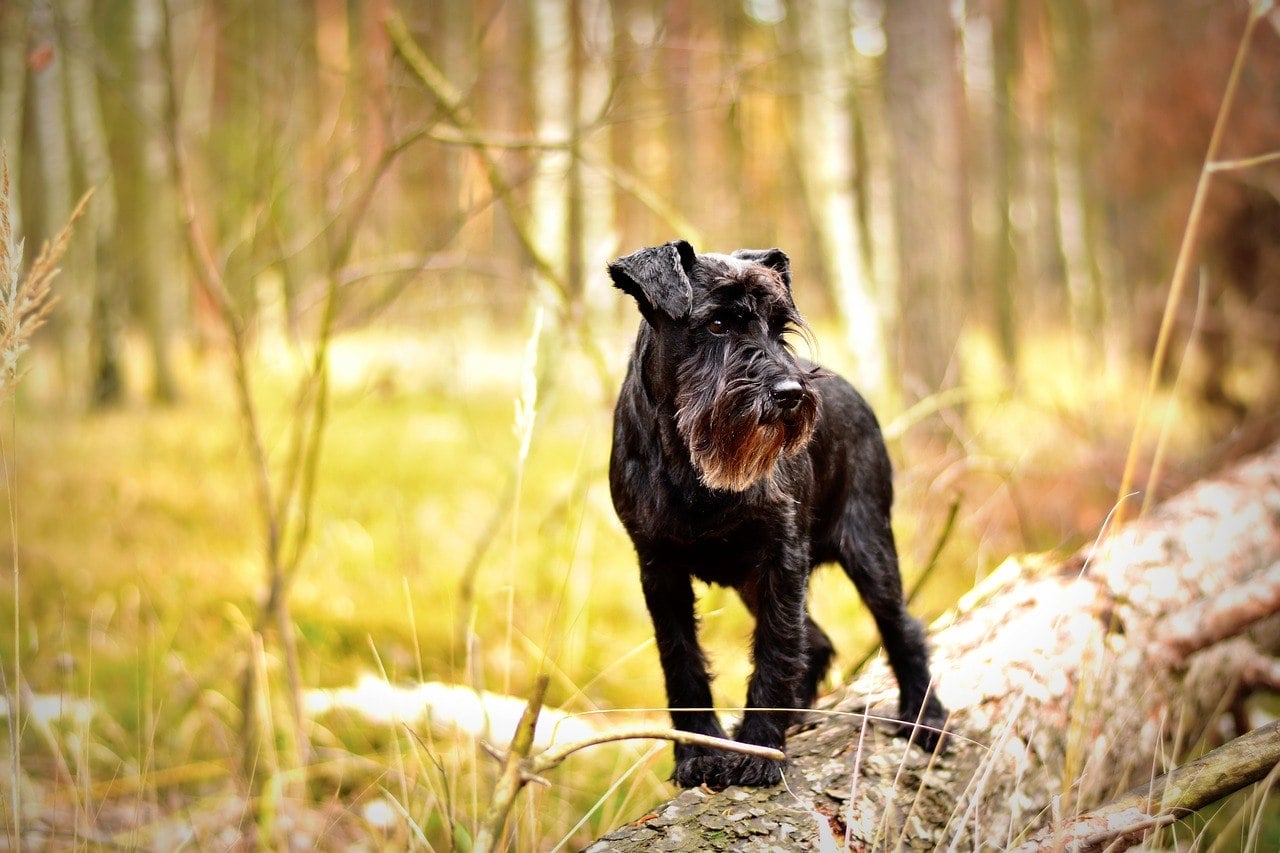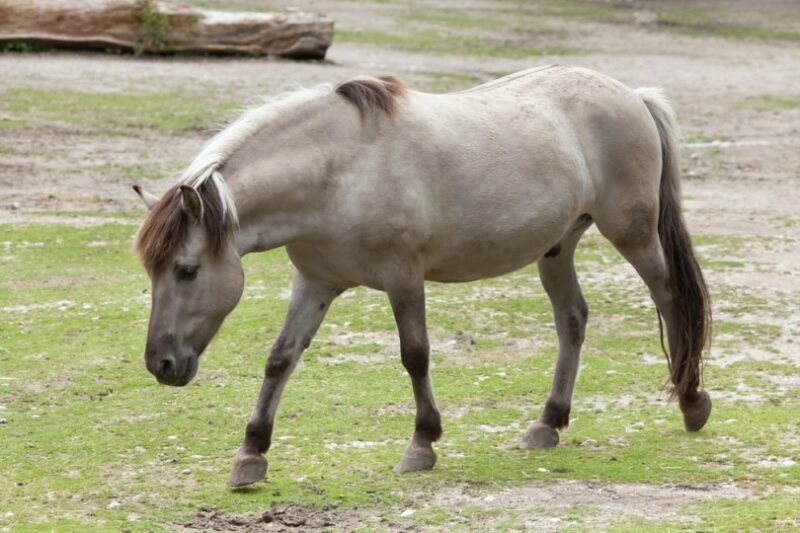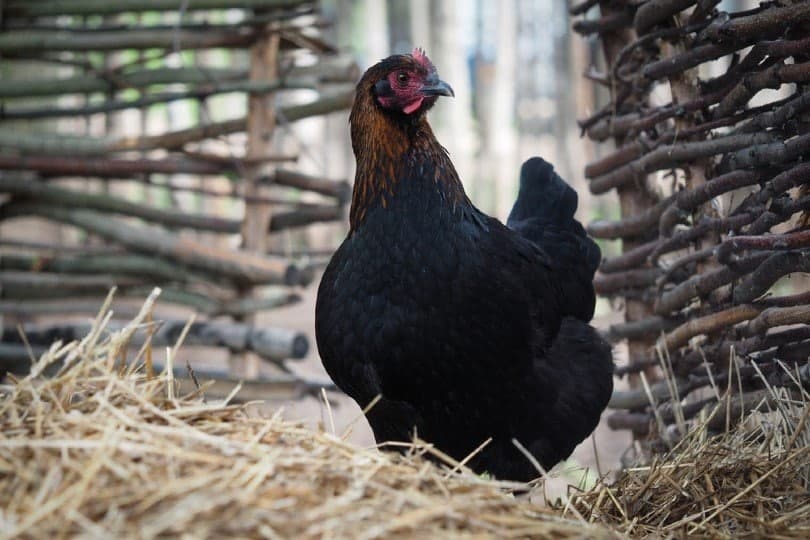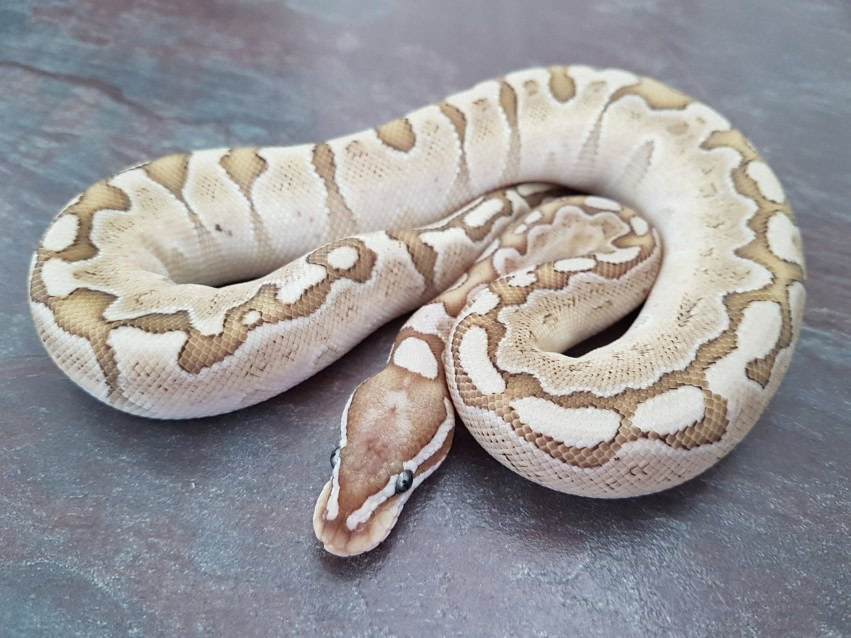Click Below to Skip Ahead
Wouldn’t it be nice if you had a companion who was agreeable, obedient, and always did what you said? Although these traits can often be hard to come by in humans, there is a dog that fits this description nicely: the Miniature Schnauzer. They are obedient, intelligent, and easy to train. They are also handsome little purebred pups that make the perfect companion pets.
Breed Overview
Height:
12–14 inches
Weight:
11–20 pounds
Lifespan:
12–15 years
Colors:
Black, black and silver, salt and pepper
Suitable for:
families with young children, active families
Temperament:
Willing to please, highly intelligent, friendly, playful
Miniature Schnauzers truly are one-of-a-kind dogs. They are the most popular Schnauzer due to their small stature and big personality. The Schnauzer breed, as a whole, is an old breed that originated in Germany, but Miniatures are much newer and are actually a result of mixing a Poodle and an Affenpinscher with small Standard Schnauzers.
But it’s not just their outgoing and playful personality that contributes to their popularity. Their unique appearance, complete with a long “bearded” face, short tail, and stocky physique combined with their trainability make them an ideal candidate for dog shows. Their medium-length, double coat, and black, black and silver, or salt and pepper coloring are other distinguishing characteristics of these beautiful dogs. If you have your eyes on owning a Miniature Schnauzer, continue reading to learn everything you need to know about caring for them.
Miniature Schnauzer Characteristics

Miniature Schnauzer Puppies
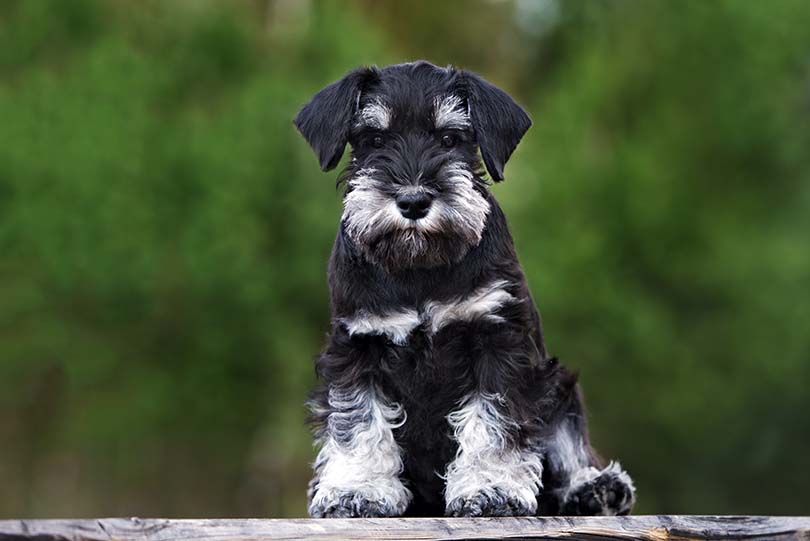
Miniature Schnauzers are not considered to be a rare breed by any means. They have been around for a long time, so you shouldn’t have any trouble finding a Miniature Schnauzer puppy if you have your heart set on one. In fact, out of 200 breeds, they are considered to be the 19th most popular breed in America.
But before you get a Miniature Schnauzer puppy, there are a few things you should know. For starters, they aren’t the most energetic dogs, but they are playful. Homes that have fenced-in yards for them to play in are definitely a plus. But due to their small size, they can live in an apartment as long as the apartment complex has a yard or dog park so that you can provide your puppy with daily exercise.
Miniature Schnauzers are highly trainable and don’t tend to be aggressive or have a huge problem with other dogs. However, their outgoing personality can overwhelm small kids and other pets. If you have pets or kids, socializing them with your Miniature Schnauzer is important. This will help your puppy form positive relationships with the other members of your household.
Schnauzers really have a zest for life and are happy-go-lucky. They can thrive in a variety of environments as long as their owners can provide everything that they need. Time and attention are very important for a Miniature Schnauzer’s well-being, so don’t get one of these puppies if you don’t have time to devote to them.

Temperament & Intelligence of the Miniature Schnauzer
Miniature Schnauzers are part of the Terrier group. If their attractive appearance wasn’t enough, their outgoing and friendly personalities make them even more lovable. They are also fearless without being aggressive, so they make great watchdogs. They won’t necessarily attack someone who they see as a threat, but they aren’t shy of barking to alert you of anything they think you should be aware of.
Miniature Schnauzers are intelligent, easy to train, and very eager to please. Their appearance and temperament make them popular show dogs, as you can get them to learn more complex tricks due to their high intelligence.
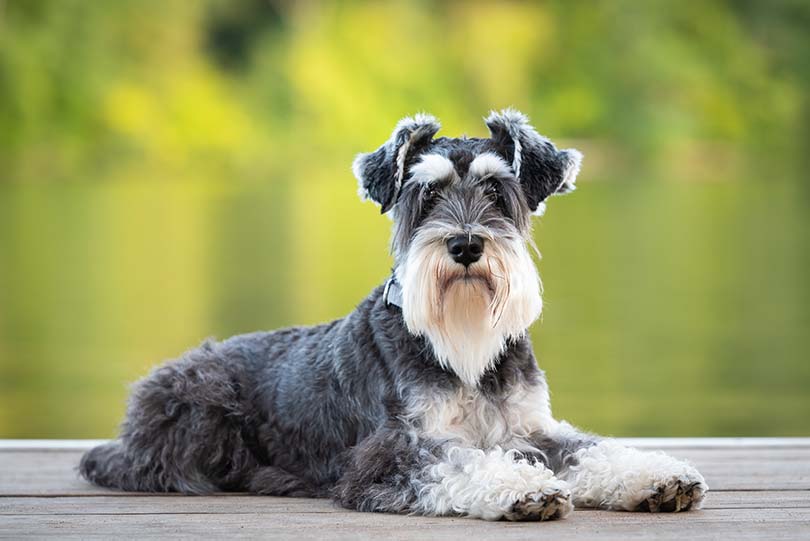
Are These Dogs Good for Families? 👪
If you have a large family, especially one with small children, a Miniature Schnauzer may be the perfect dog. In terms of family life, they get along well with any family member. This is due in part to their friendly and gentle temperament but also because of their outgoing personality.
Although they aren’t the most energetic dogs, Miniature Schnauzers are playful and make great companions for children who need someone to run around in the yard with them. Your Mini Schnauzer will love playtime with your kids and will be protective of them at the same time.
However, it’s important to supervise children around your Miniature Schnauzer. You may have to teach them how to behave and interact with your dog, and you may have to teach your dog how to interact with children.
Does This Breed Get Along with Other Pets? 🐶 😽
Miniature Schnauzers are more sociable around people than they are with other pets. However, they should get along fine with other pets, including dogs, as long as they are socialized properly and from an early age. However, they also do just fine being the only dog in the house.
Cats shouldn’t be a problem with your Miniature Schnauzer either. But, if you have small furry pets, such as hamsters, guinea pigs, or mice, you may want to keep them away from your Mini if you like to take them out of their cage.

Things to Know When Owning a Miniature Schnauzer:
Food & Diet Requirements 🦴
Remember that Miniature Schnauzers are purebred pups with a unique coat. In order to maintain their health and keep their coat looking its best, they need to be fed a diet consisting of high-quality dog food. Good dog food to feed a Miniature Schnauzer will have real meat as the first ingredient, preferably lean proteins such as chicken or turkey. It should also be free of fillers and artificial ingredient
Carbohydrates are also essential in a Miniature Schnauzer’s diet. Look for foods that have carbohydrates such as rice, barley, or other plant ingredients. Obesity doesn’t seem to be a common issue among Miniature Schnauzers, but all dogs can become overweight. Foods that are low in fat are easier to digest and can help your dog maintain their weight and activity level.
Another contributing factor to your Miniature Schnauzer becoming overweight is if food is left out for them all day. They have a tendency to overindulge in food if given the opportunity, and as a result, you may think that they need more food than what you are feeding them.
Generally, adult Miniature Schnauzers only need around ½ cup of food fed to them twice a day. Younger pups may need to be fed less food more often, maybe even three to four times a day. Do not exceed 1 cup of food per day so that you can help your dog stay healthy. And make sure that any food you feed them is appropriate for your dog’s age (for example, high-quality puppy food for young Miniature Schnauzers).
Exercise 🐕
Miniature Schnauzers have a medium level of energy, so they don’t necessarily need several hours of exercise a day. However, they need daily exercise to stimulate them mentally and physically. And despite not having extremely high energy levels, they are playful pups who love going for walks or running around chasing a ball.
If you live in the country, you should have no absence of land for your pup to run around on. But if you live in the city, a daily walk or trip to the park will be the easiest way for you to provide the exercise they need to stay healthy. In either case, you must keep your dog on a leash unless they are in a fenced-in area. They are likely to chase after a squirrel or another small animal if they see one due to their background in hunting rats and other small rodents.
Training 🎾
Miniature Schnauzers are one of the most trainable breeds, hence why they are such popular show dogs. Part of their trainability is due to the fact that they are highly intelligent, but it’s also because they have a strong desire to please their owners. If they see that something makes you happy, it makes them happy as well.
As a result, they tend to pick up on tricks and commands really quickly, especially when they are showered with love and affection for doing a good job. Treats can also be used as a positive reinforcement tool, but don’t give your dog too many since it can lead to unnecessary weight gain.
Even though Miniature Schnauzers are highly intelligent and trainable, it’s worth noting that they won’t pick up on more advanced commands quickly, especially if they are puppies. But they should pick up on basic commands pretty easily, as long as you go slow and teach the commands one at a time until they have mastered them. Remember that no matter how smart they are, puppies of any breed have short attention spans.
Grooming ✂️
Grooming is definitely the area in which a Miniature Schnauzer requires the most specialized care. They are classified as being hypoallergenic, with a low to medium shedding level depending on the time of year. But, their unique double coat, consisting of a wiry topcoat and soft undercoat, requires almost daily brushing to keep it looking its best.
Some Miniature Schnauzer owners groom their dogs regularly to keep the topcoat short, especially if they compete in dog shows. If the coats are kept long, they are usually hand-stripped for the shows.
It’s often much easier to have the coat trimmed, preferably once every 6 to 8 weeks, in order to keep the coat looking its best. Other grooming activities such as a bath and nail trimmings can be done monthly. But again, if you are planning for your dog to compete in shows, baths and nail trimmings may need to occur more frequently.
Health and Conditions 🏥
- Cataracts
- Hyperlipidemia
- Liver shunts
- Pancreatitis
- Urinary stones
Miniature Schnauzers are generally healthy dogs when they are provided with the right amount of exercise and an appropriate diet. However, as with all purebred dogs, they are prone to developing genetic conditions which may or may not be serious.
One such condition is hyperlipidemia, which can be hereditary or brought about by other causes. It occurs when lipids build up in the bloodstream and is similar to high cholesterol in humans, which is another example of why it is important to feed your Miniature Schnauzer a low-fat diet. It can be serious if not identified and controlled and can even lead to other conditions such as pancreatitis. But with medication or another form of treatment, it shouldn’t cause any long-term problems for your dog.
A minor medical condition that is often hereditary in Miniature Schnauzers is cataracts. Cataracts most often affect older dogs but can be caused by conditions such as diabetes as well. They won’t cause your dog to go blind, but cataracts can cause changes to the lenses of your dog’s eye. This most often results in a cloudy film that covers all or part of the eye. They don’t pose any serious risks to your dog’s health, but they can be removed through surgery.
Male vs Female
The main differences between male and female Miniature Schnauzers are mostly physical. Although their height isn’t much different, female Miniature Schnauzers tend to weigh a few pounds less than males on average. This is mostly due to the fact that females have less muscle mass than males with a bit of a slimmer physique.
Regarding temperament, male and female Miniature Schnauzers have great personalities. Females tend to be slightly less sociable than males, but they are more focused and are a little bit easier to train as a result. Females also mature mentally more quickly than males do, and they are a little bit cleaner than males.
However, males tend to be more sociable and form strong bonds with all members of their family. As a result, they tend to be more protective of the family as a whole, instead of one individual person in the family. And even though males get distracted more, they are still easy to train because they have a stronger desire to please their owners than females.


3 Little-Known Facts About the Miniature Schnauzer
1. They Were Originally Bred as Farm Dogs
Miniature Schnauzers were bred to keep small vermin, such as mice and rodents, away from the barn and crops.
2. They Have a Unique Coat
These dogs are very popular at dog shows, but their coat requires special care in order to be presented in a show. The double coat needs to be hand-stripped, so many owners just keep it cut back to avoid this expensive and time-consuming process.
3. Schnauzers Are an Old Breed, But Miniatures Are More Recent
Schnauzers have been found in pictures dating back to the 15th century. Miniature Schnauzers are derived from the Standard Schnauzer and weren’t recognized as a distinct breed until the late 1800s.

Final Thoughts
A Miniature Schnauzer is one of the most interesting purebred dogs you can own. Their intelligence, obedience, and playful nature make them the perfect companion for families large or small, and they’ll also provide protection and affection. All you have to do is turn that affection back around to them by providing the love and care that they need to truly let their big personalities show.
You may also want to read:
- Miniature Schnaupin (Miniature Schnauzer & Pinscher Mix)
- Carnauzer (Miniature Schnauzer & Cairn Terrier Mix)
- Schnekingese
Featured Image Credit: IsabellWolf, Pixabay
